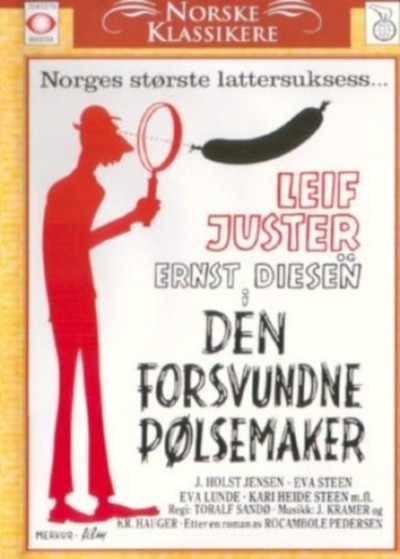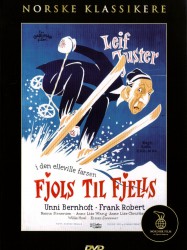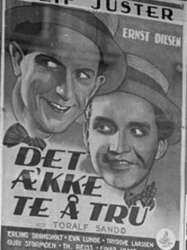Den Forsvundne Pølsemaker est un film de genre Comédie avec Leif Juster
Den Forsvundne Pølsemaker (1941)

Si vous aimez ce film, faites-le savoir !
Den forsvundne pølsemaker (English: The sausage-maker who disappeared) is a 1941 Norwegian comedy film written and directed by Toralf Sandø, starring Leif Juster and Ernst Diesen. Private investigators Gløgg (Diesen) and Rask (Juster) have been hired to trace a butcher (or sausage-maker) who has disappeared. This leads the two into a number of adventures. The movie is today best known for Juster's performance of the song "Pølsemaker, pølsemaker".
Acteurs
Commentaires
Postez un commentaire :
Suggestions de films similaires à Den Forsvundne Pølsemaker
Il y a 9 films ayant les mêmes acteurs, 37148 ayant les mêmes genres cinématographiques, pour avoir au final 70 suggestions de films similaires.Si vous avez aimé Den Forsvundne Pølsemaker, vous aimerez sûrement les films similaires suivants :

Fjols til fjells (1957)
, 1h36Genres Comédie
Acteurs Leif Juster, Einar Sissener, Liv Ullmann
Note72%





When two guests who look exactly alike arrive at Hurlumhei hotel, the manager Poppe, thinking they are one person, begins questioning if he's going mad. Meanwhile, the daughter of the hotel director disguises herself as a piccolo at the hotel to prove to her father that she's not just a spoiled child.

Bussen (1963)
, 1h30Réalisé par Finn Henriksen, Arne Skouen
Genres Comédie
Acteurs Dirch Passer, Leif Juster, Karl Stegger, Paul Hagen, Ove Sprogøe, Lone Hertz
Note68%





The protagonist is a jovial bus driver, well beloved by his passengers, essentially the whole community around him. The bus, however, is old, and needs to be replaced. The bus driver himself is also needed as a handyman for all the people around him, assisting with stray cattle, household machines, children's homework, errands of all kinds, and at one occasion, assisting birth. Progress is however leaving him behind, and the local county council plots on a solution, involving a new bus and driver. The community revolts, and the local midwife (married to the mayor) intervenes with all the locals to keep the bus driver, who ends up keeping his job in a new bus.

Deilig er fjorden (1985)
, 1h42Genres Comédie
Acteurs Rolv Helge Wesenlund, Øivind Blunck, Leif Juster, Henki Kolstad, Harald Heide-Steen jr., Anne Marie Ottersen
Note57%






Moonrunners (1975)
, 1h50Origine Etats-Unis
Genres Comédie, Action
Thèmes Transport, Automobile, Road movie
Acteurs James Mitchum, Kiel Martin, Arthur Hunnicutt, George McFarland, Joan Blackman
Note59%





Les frères Lee (Hagg en version originale), transportent de l'alcool illégalement pour le compte de leur oncle Jesse, en faisant face à Jake Rainey, un homme d'affaires intéressé par ce trafic, et le shérif Roscoe Coltrane, prêts à tout pour arrêter les frères Lee.

El ministro y yo (1976)
, 1h40Réalisé par Miguel M. Delgado
Genres Drame, Comédie
Acteurs Cantinflas, Ángel Garasa, Pedro Damián, Socorro Avelar
Note66%





Mateo Melgarejo (played by Mario Moreno "Cantinflas") is a notary public and scribe for the illiterate people of Santo Domingo, a neighborhood north of Mexico City's Zócalo. A squatter friend asks for his help in negotiating with the land census bureau to regularize a land title. After a great deal of frustration with the government bureaucracy, he writes a letter to the cabinet minister, earning an audience with him. The minister hires Melgarejo to reform the bureau, and the appointee proceeds to lecture the officials on their duties in a democratic society. At the end, he gives up the post, returning to Santo Domingo to help its poor residents.

Mi novia el travesti (1975)
Genres Comédie
Thèmes Sexualité, Homosexualité, Transsexuels et transgenres, LGBT, LGBT, Travestissement au cinéma
Acteurs Alberto Olmedo, Marcos Zucker, Tincho Zabala, Adolfo Linvel, Pablo Cumo, Jorge Porcel
Note64%






Mexico, Mexico, ra, ra, ra! (1976)
Genres Drame, Comédie, Policier
Acteurs Ernesto Gómez Cruz, Jorge Russek, Patricia Reyes Spíndola, Alma Delfina, Leticia Perdigón, Ana Ofelia Murguia
Note66%





 Connexion
Connexion





